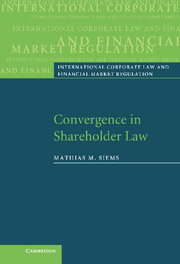Preface and acknowledgments
Published online by Cambridge University Press: 15 December 2009
Summary
In the last fifteen years, the words ‘globalization’, ‘internationalization’ and ‘Europeanization’ have been seen and heard everywhere. The legal discussion has been no exception: on the one hand, it has sometimes been claimed that national legal systems are increasingly convergent. On the other hand, advocates of the counterhypothesis maintain that convergence of legal systems is neither realistic nor necessary. This book takes a look at how to approach this issue in relation to shareholder law. Although there are already some publications which deal with company law convergence, the reader is often left disappointed. With respect to similarities and differences between countries, the previous literature is dominated by broad statements about different corporate governance systems and anecdotal stories of convergence. A detailed legal analysis is, however, lacking. Similarly, with respect to convergence forces and hurdles, there has often been only a perfunctory analysis of particular topics, such as regulatory competition or shareholder ownership. But, again, a coherent and comprehensive account is missing. Thus, this book aims at filling that gap. Its structure is as follows. First, it compares the company laws of the United Kingdom, the USA, Germany, France, Japan and China. Secondly, it analyzes economic and political factors, which might (or might not) lead to convergence. Finally, it assesses this development.
I started writing the German version of this monograph in June 2001 when I was just finishing my LLM in Edinburgh.
- Type
- Chapter
- Information
- Convergence in Shareholder Law , pp. ixPublisher: Cambridge University PressPrint publication year: 2007

